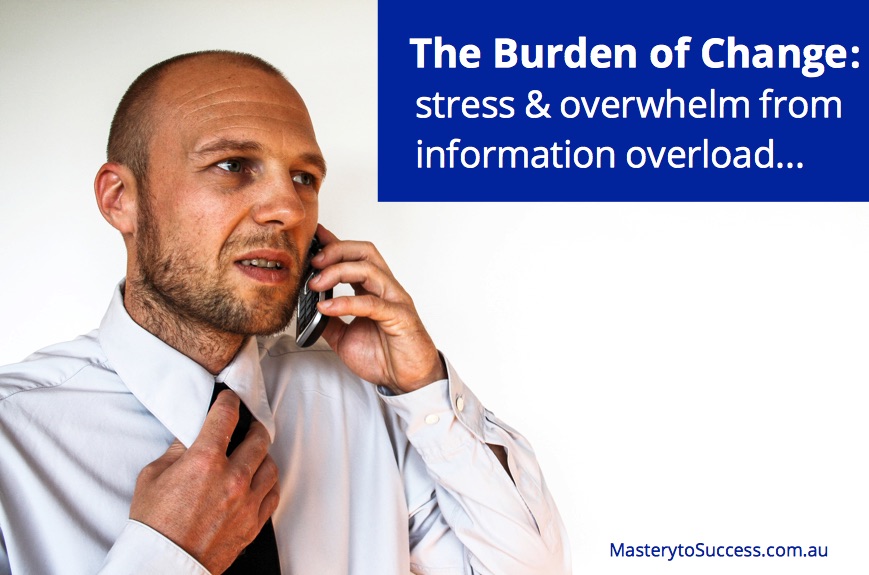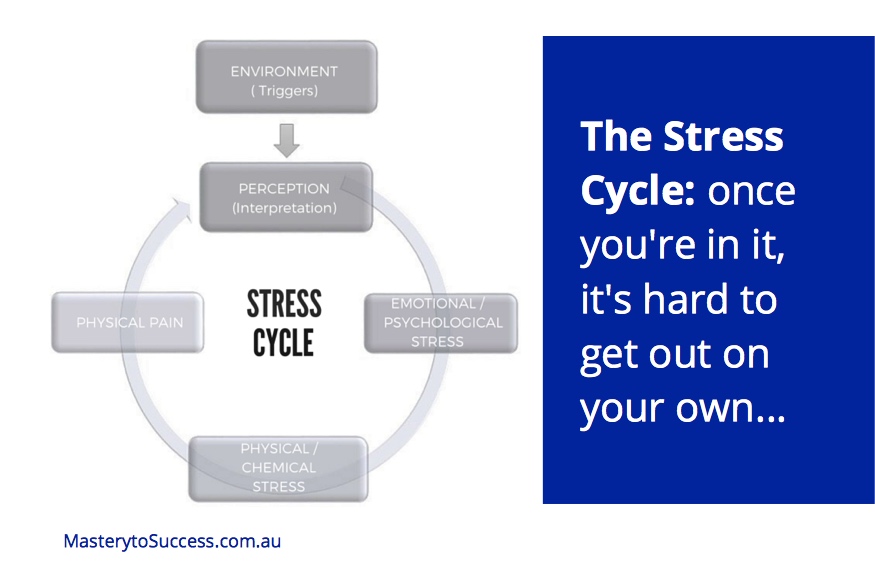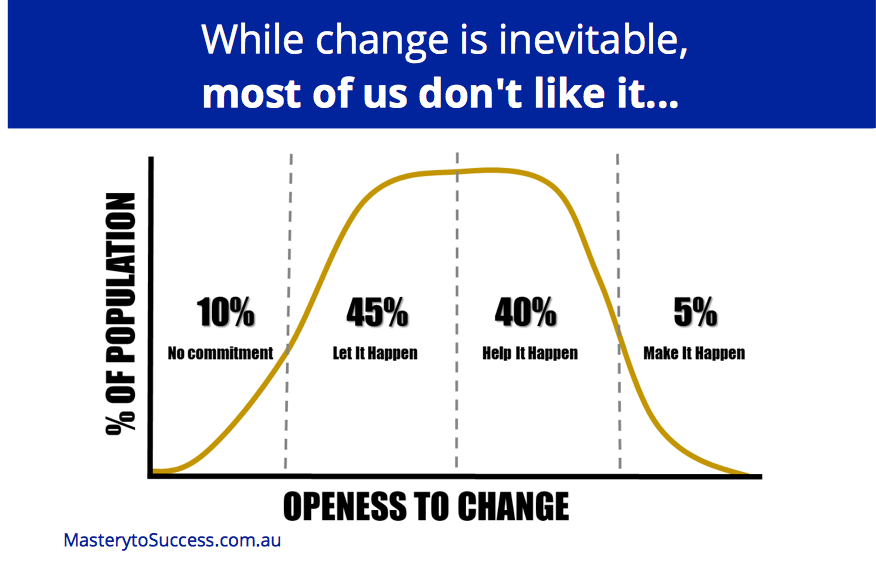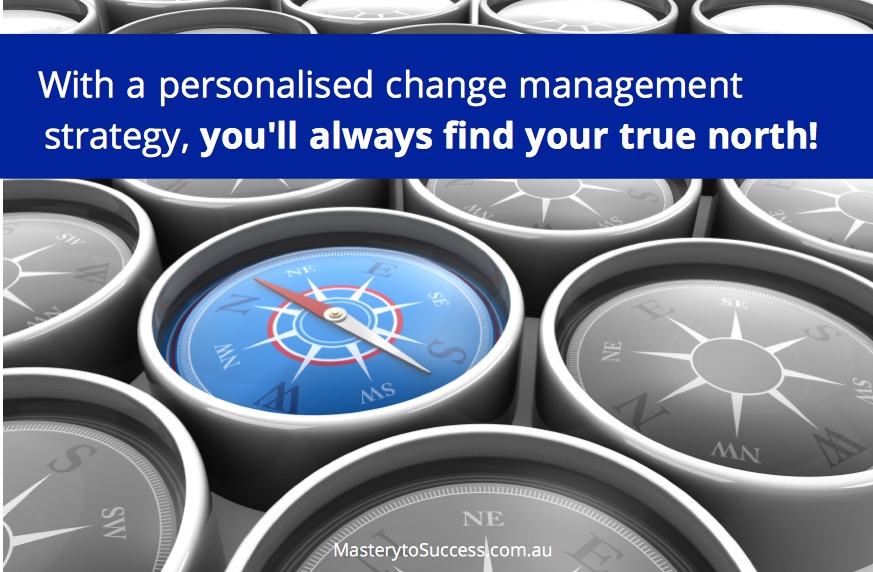Overwhelmed By Change? 5 Habits To Move From Stress To Success
There is so much change happening around me, I’m not sure how to manage it in a healthy way… Does that sound familiar?
Change and how it’s handled can strengthen or weaken a person and/or a team. People react to change in many different ways and for very individual reasons.
We are creatures of habits. And that’s why we react to change most of the time in a negative way.
The inability to adapt to change is a major source of stress in our modern society and has become a natural part of life. As a leader endowed with the responsibility to manage teams and resources, you are in a particular ‘hot spot’ prone to ‘change management’ induced stress.

Executives and managers alike are exhausted by their brutal schedules and the intense demands on them. The result? Health problems – such as insomnia, depression, high blood pressure, adrenal fatigue, stomach ulcers, chronic stress, and anxiety, to cite only a few – leading to the deterioration of relationships and weakened job performance.
- Are you feeling that you lost your spark lately?
- Is your partner telling you you’re not really present at home and something isn’t quite right?
- Are you forgetting simple things and feeling not in the mood when you get home?
Many busy executives have been self-medicating with coffee and energy drinks by day and a couple of drinks and a sleep aid at night. They overeat, or they don’t eat, and exercise quickly drops off their ‘to-do’ list. They find it hard to manage change in a healthy way.
Having spent many years in medical research – studying how our cells and body react/adapt to a changing environment – we are well aware of the impact of disruptive technologies and the deluge of information.
Crushing economic pressure, cut-throat competition, ramping expectations, crazy work hours, and slashed budgets are too familiar these days. Almost every organisation – including yours – has been trying to do more with less lately, and it’s taking a toll.
Life changes can be both positive and negative and while we generally don’t mind the positive ones, we often dread and resist the perceived negative ones. The inability to adapt to change is what we call stress, and it can lead to numerous physiological changes.
Without appropriate management strategies to cope with the ever-increasing pace of change and complexity of life, these can – and they definitely will – affect your physical, mental, and emotional health.

Michelle, a marketing director in a leading natural health science company was experiencing some minor aches and feeling a bit low and unmotivated compared to usual. She had not been sleeping well for a while too and found that she had been putting on weight for the previous few months. Although Michelle had not changed her routine and nothing major had happened in her personal life and to her family, a series of small changes (outside of her department) had been recently introduced.
While she thought she was managing okay and not feeling too stressed about these minor changes (since they were not directly concerning her work), her body signs and symptoms were telling a totally different story. Michelle exhibited various signs of change-induced stress, suggesting that she was having difficulty in managing those apparently little, ‘insignificant’ changes. Although Michelle was not consciously paying too much attention to these small changes – having the impression that she was doing just fine – subconsciously, stress was building gradually, affecting her health and productivity at work. More importantly, it was starting to affect her level of satisfaction, morale and meaning at work.
Michelle’s example is a good reminder that not only significant and direct changes can have dramatic and predictable consequences, but unmanaged, apparently insignificant, small changes can also cripple your health if you don’t pay attention to your body signs and symptoms and act accordingly in a timely manner.

People react to change differently. A series of psychological studies on change management has revealed four distinct typical behavioural reactions to change.
- People who resist change and need time to prepare – They will put up with change and it may not be easy to tell how deeply they are impacted by the changes around them until much later. They may be invisible ticking time bombs…
- People who are concerned with the effects of change – Cautious and careful, they seek to maintain high standards regardless of the changes going on around them. Often they don’t even know they are unconsciously living a constant ‘fight or flight’ mode.
- People who are not bothered by change – Their enthusiasm and creative solutions to handling change keeps everyone motivated during flux situations.
- People who thrive on change – They are usually the ones that initiate the change activity within a team and challenge the status quo.
By now, you probably know in which category you fit in and you may also have identified which category some of your colleagues or team members fall into.
Developing an adequate and personalised ‘change management’ strategy is not a luxury, but rather a necessity to thrive in our fast-paced modern society.

Helping executives and business leaders to develop personalised strategies to manage change, and the stress associated with change represents one of the ways we assist people in our coaching and mentoring.
Breaking your habitual responses to change and stress isn’t easy. You may feel you don’t have time to exercise, eat right or reprogram your stress behaviours. But consider this: Your current high level of stress may be your new normal. That breakneck pace, that uncertainty, that increased responsibility – they may be yours to keep.
While change is inevitable, there are a few simple things we can do to manage stress and overwhelm.
- Physical exercise – A very effective practice to switch off, let go of physical tension and calm the mind. Making sure you schedule regular physical exercise in your week can dramatically help you stay afloat when there is a lot of pressure and change going on at work.
- Cut down stimulants – Obvious, but often ignored. If you’re already stressed and overwhelmed, there is no point to add more. Cut down coffee, energy drinks, and watch what happens.
- Take the time to get out and about in Nature – Spending time in a calm and serene environment such as going for walk in the forest, or simply a walk on the beach on the weekend can make a big difference when you get back to work on Monday morning.
- Meditation – Most people think that meditating is about trying to get a “blank mind”. It’s not possible to shut off your brain. The point of meditation is to observe your thought and not get attached to them and simply watch them coming and going, without reacting. It teaches you the develop awareness and balance at the same time. A great practice to introduce in your daily or at least weekly routine.
- “Me time” – This is time for yourself. It doesn’t really matter what you do, as long as you enjoy it, and you feel calm and relaxed. It’s to restore the balance between time for yourself and the time you devote to others. To function optimally, there needs to be a balance between what we give and receive. We tend to mostly focus on giving. When you’re honouring your “me time” you’re in a receiving mode.
These are simple ideas that can make a huge difference in your life. Without taking the time to take better care of yourself, trouble will find you sooner or later (usually sooner).
Finally, If you are still finding it difficult to stay cool under pressure, well, reach out. Help is always around when you need it most. It’s just a matter of asking…

In Nutshell:
Developing your own personalised change management strategy is not a luxury but a necessity if you want to grow, evolve and tap into your full potential. You make your best contribution when you function optimally. Don’t put yourself last…

ABOUT US
Drs. Marcia & Olivier Becherel are Personal Leadership Specialists, Life & Business Strategists, Executive Coaches, and the founders of Mastery to Success.
Our mission is to help you activate your personal leadership and tap into your unique design so you can create a clear path forward and enjoy a rewarding, fulfilling, and meaningful life and career.
We help high-achieving professionals, business owners, and emerging leaders to break through to the next level of their life and career by creating a clear path forward.
With more than two decades of experience, our coaching experience and skillsets have set new standards in tuning the human mind, body, and behaviour to achieve greater success, fulfilment, and impact by mastering the science of personal leadership.
Combining our coaching experience and expertise in neuroscience, human behaviour, leadership, the mind-body connection, and business, we work as a powerful team to deliver real-life results fast for our clients.
FIND OUT MORE 👩💻
Want to know more about how we might be able to help you, please visit our websites:
✅ Step Up To The Next Level with a Clear Path Forward with Drs. Marcia & Olivier Becherel
https://MasteryToSuccess.com.au
✅ Activate Your Personal Leadership to Accelerate Your Career & Success with Dr. Olivier Becherel
✅ Break Through Mental & Emotional Roadblocks To Reclaim Your Personal Power with Dr. Marcia Becherel
CHAT WITH US 📩
Want to have a quick chat with us to get more clarity on yourself and on the way forward?
☎️ Schedule an obligation-free call at https://masterytosuccess.com.au/clarity
FOLLOW US & CONNECT WITH US
https://www.instagram.com/drolivierbecherel/
https://www.instagram.com/drmarciabecherel/
https://facebook.com/masterytosuccess
https://www.linkedin.com/in/olivierbecherel/
https://www.linkedin.com/in/marciabecherel/
📺 SUBSCRIBE to our YouTube Channel for more tips and wisdom! 👍🏻
https://www.youtube.com/channel/UCVENNApNuo1Zk8iAW4OCKmQ
